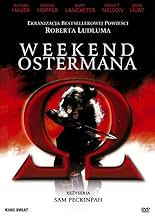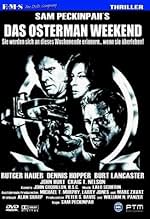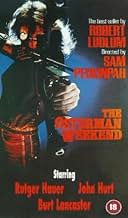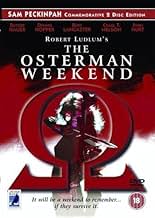IMDb RATING
5.8/10
9.6K
YOUR RATING
During the Cold War, a controversial television journalist is asked by the C.I.A. to persuade certain acquaintances, who are Soviet Agents of the Omega network, to defect.During the Cold War, a controversial television journalist is asked by the C.I.A. to persuade certain acquaintances, who are Soviet Agents of the Omega network, to defect.During the Cold War, a controversial television journalist is asked by the C.I.A. to persuade certain acquaintances, who are Soviet Agents of the Omega network, to defect.
- Awards
- 2 wins
- Director
- Writers
- All cast & crew
- Production, box office & more at IMDbPro
Storyline
Did you know
- TriviaDirector Sam Peckinpah was in ill-health throughout the shoot. The long-term toll of his drug and alcohol abuse suggested to many in the production that he was dying. Peckinpah would go off and take opportune naps, but still completed and delivered his initial cut of this movie on time, despite sickness and exhaustion.
- GoofsThe surveillance cameras installed in the Tanner house each have a red light to indicate that they are working. Surely a camera for secret surveillance would not have a visible indicator for all to see.
- Quotes
Lawrence Fassett: Think of them as fleas on a dog hit by a car driven by a drunken teenager whose girlfriend just gave him the clap. It will help your sense of perspective.
- Alternate versionsOn the Anchor Bay DVD release there is a rough cut made by Sam Peckinpah which he made showed to the test audience. Because the majority of the audience walked out, from the imfamous sex between Fassett and his wife. The producer wanted Peckinpah to cut the scene out. Once he refuse to made the cuts, he got fired. Other scenes. 1) The sex scene is more extended and shot more wobbly to express how Fassett breaking point for revenge had started. 2) Delete scene of Osterman and Joe talking on the phone about their deal. 3) Extended scene of Virginia flirting with Dick on the phone. 4) There a deleted scene of John Tanner of having an affair with his director Marcia, there wakes up to find her dead. 5) The scene where Tanner and guest are arguing by the dinner table, in the theatrical cut Fassett switches on a Swiss ad, the Peckinpah's cut he has like a big image of Danforth. 6) Alterative ending is juxtapositioned between Tanner searching for his family and the TV studio.
Featured review
It's Sam Peckinpah's last film, and as a fan of this brilliant, troubled man, I wanted it to be a good one to go out on. What I got instead is another of his problem pictures, an interesting premise and eye-raising performances done in by a loss of focus.
John Tanner (Rutger Hauer) is a TV interviewer given an unpleasant assignment by CIA operative Lawrence Fassett (John Hurt): Confront a group of college friends with evidence they are working for a KGB operative named Mikalovich. An array of videotapes provided by Fassett demonstrates their culpability to Tanner. So he sets to work, his home the setting for a prearranged weekend gathering. If it works, a live interview with CIA Director Maxwell Danforth (Burt Lancaster) will be his reward.
For Peckinpah, it was his first film in more than half-a-decade, and a chance to show he was still able to deliver a solid action film well after his gritty early-'70s peak. The CIA comes equipped with cool surveillance equipment and laser-sighted automatics. The Weekend itself, once it gets going, has a nice "Big Chill" vibe with paranoid undertones.
So what goes wrong?
It starts with a 40-minute intro that establishes the premise in clunky fashion. "I'm Cloak, you must be Dagger" Tanner says upon meeting Danforth, whom Lancaster plays with brio but not subtlety. "Being wrong is not nearly as important as not admitting it, not these days," he tells one Company weasel, and acts throughout as the kind of clod you wouldn't put in charge of a shoe store, let alone the CIA.
Then we get to the Weekend itself, with Tanner's college friends taking center stage. Each has their quirks. Osterman (Craig T. Nelson) is a very cool TV producer who describes himself as "a nihilistic anarchist who lives on residuals". Nelson is great fun, though the rest of the group, including Dennis Hopper, gets lost in the mix. Only Helen Shaver's turn as a coked-out floozy stands out, as much for her gratuitous nude scenes as for her entertaining freak outs.
Sappy lite-jazz music by Lalo Schifrin underscores a lack of suspense. Hauer's Dutch accent keeps creeping in like Nastassja Kinski's, and his fragile relationship with his bow-toting wife (Meg Foster) isn't developed any more than those with his once-merry, now-sullen Berkeley chums.
The actual jigsaw puzzle we get here is indifferently assembled and seems at end a few pieces short. At one point Tanner hears Osterman on tape tell his friends "Let's go to our friend John Tanner's house and set him up". Tanner doesn't take this kindly, reasonably enough, yet what Osterman may have meant is never explained. A lot of threads are pulled out this way only to be left floating in the breeze.
John Coquillon's cinematography does capture something the rest of the film flails at, a sense of mystery and foreboding. Hurt's tortured performance as Fassett is nicely underplayed, watching beady-eyed between sips of wine from a china cup as the gears shift into play. And Nelson does crack me up, as in one scene which finds him running for cover.
"It'd be nice if we had weapons!"
"We do!" he is told. "Bows!"
"Bows?" Osterman replies. "That's keen!"
In the end, we get a wrap-up lecture about the pervading influence of television and how this all was, as one character puts it, "just another episode in this snuff soap opera we're all in." Peckinpah supposedly hated this script, only using it because he needed the film, but I think those sad words represent his actual mindset all-too-well. Distrait, somewhat lethargic, and depressing, "The Osterman Weekend" gives us lots of clues but no answers as to where Sam fell off.
John Tanner (Rutger Hauer) is a TV interviewer given an unpleasant assignment by CIA operative Lawrence Fassett (John Hurt): Confront a group of college friends with evidence they are working for a KGB operative named Mikalovich. An array of videotapes provided by Fassett demonstrates their culpability to Tanner. So he sets to work, his home the setting for a prearranged weekend gathering. If it works, a live interview with CIA Director Maxwell Danforth (Burt Lancaster) will be his reward.
For Peckinpah, it was his first film in more than half-a-decade, and a chance to show he was still able to deliver a solid action film well after his gritty early-'70s peak. The CIA comes equipped with cool surveillance equipment and laser-sighted automatics. The Weekend itself, once it gets going, has a nice "Big Chill" vibe with paranoid undertones.
So what goes wrong?
It starts with a 40-minute intro that establishes the premise in clunky fashion. "I'm Cloak, you must be Dagger" Tanner says upon meeting Danforth, whom Lancaster plays with brio but not subtlety. "Being wrong is not nearly as important as not admitting it, not these days," he tells one Company weasel, and acts throughout as the kind of clod you wouldn't put in charge of a shoe store, let alone the CIA.
Then we get to the Weekend itself, with Tanner's college friends taking center stage. Each has their quirks. Osterman (Craig T. Nelson) is a very cool TV producer who describes himself as "a nihilistic anarchist who lives on residuals". Nelson is great fun, though the rest of the group, including Dennis Hopper, gets lost in the mix. Only Helen Shaver's turn as a coked-out floozy stands out, as much for her gratuitous nude scenes as for her entertaining freak outs.
Sappy lite-jazz music by Lalo Schifrin underscores a lack of suspense. Hauer's Dutch accent keeps creeping in like Nastassja Kinski's, and his fragile relationship with his bow-toting wife (Meg Foster) isn't developed any more than those with his once-merry, now-sullen Berkeley chums.
The actual jigsaw puzzle we get here is indifferently assembled and seems at end a few pieces short. At one point Tanner hears Osterman on tape tell his friends "Let's go to our friend John Tanner's house and set him up". Tanner doesn't take this kindly, reasonably enough, yet what Osterman may have meant is never explained. A lot of threads are pulled out this way only to be left floating in the breeze.
John Coquillon's cinematography does capture something the rest of the film flails at, a sense of mystery and foreboding. Hurt's tortured performance as Fassett is nicely underplayed, watching beady-eyed between sips of wine from a china cup as the gears shift into play. And Nelson does crack me up, as in one scene which finds him running for cover.
"It'd be nice if we had weapons!"
"We do!" he is told. "Bows!"
"Bows?" Osterman replies. "That's keen!"
In the end, we get a wrap-up lecture about the pervading influence of television and how this all was, as one character puts it, "just another episode in this snuff soap opera we're all in." Peckinpah supposedly hated this script, only using it because he needed the film, but I think those sad words represent his actual mindset all-too-well. Distrait, somewhat lethargic, and depressing, "The Osterman Weekend" gives us lots of clues but no answers as to where Sam fell off.
- How long is The Osterman Weekend?Powered by Alexa
Details
Box office
- Budget
- $6,500,000 (estimated)
- Gross US & Canada
- $6,486,797
- Opening weekend US & Canada
- $301,129
- Oct 23, 1983
- Gross worldwide
- $6,486,797
Contribute to this page
Suggest an edit or add missing content



































